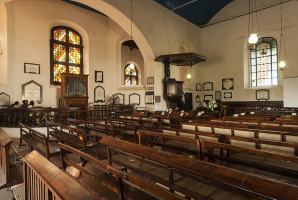Christian Relief Groups Highlight Plight of Displaced Pakistani Women, Young Girls
Displaced women and young girls are facing increasingly severe hardships in the Mardan and Swabi areas of Pakistan, according to a worldwide alliance of churches and related agencies.
As members of Action By Churches Together International deliver assistance and continue to assess the needs of the 2.5 million displaced persons in the northwestern part of Pakistan, staff are reportedly observing a significant lack of access to cooked food, hygiene facilities and health services for displaced women.
"One of the most critical issues is the lack of health facilities for women, particularly with the lack of female health staff," reported Saleem Dominic of Church World Service (CWS) after returning from the field over the weekend.
Since the Pakistani army launched an offensive to expel Taliban and Al-Qaeda militants occupying the northwest area of Pakistan, close to the border with Afghanistan, millions of people have fled their homes. Around 80 percent of the former residents of the region have since found shelter in neighboring host communities. Those who have found themselves in one of the displaced persons' camps that were installed, meanwhile, find themselves surrounded by an increasing number of people in places with insufficient sanitary and medical facilities.
"The flow of IDPs does not come to a halt," commented Dr. Branko Dubajic, country health coordinator in Pakistan for faith-based Malteser International, which has put a focus on the medical care for pregnant and breast-feeding women and young children as they are particularly vulnerable.
"Displaced people are not only exposed to the ongoing fighting, but also to extreme weather conditions: above 40 degree Celsius during the day and around 0 degree Celsius in the night. Hunger, thirst, diseases and exhaustion aggravate their condition. Some of them have already been trying to escape from the fighting for about one year now," Dubajic added.
Women, especially, are having difficulty accessing assistance at male-dominated locations inside and outside the camps, according to ACT International.
More and more women, with their children, are arriving in the Swabi area unaccompanied by their husbands, who are staying behind in the conflict area to take care of property and crops. Without their husbands, many women face further difficulties accessing basic services.
Young children under the age of two, meanwhile, are not able to consume the cooked food that is available at the camps.
"And parents have nothing to offer to their children," reported James John from Norwegian Church Aid (NCA).
On Wednesday, U.S. envoy Richard Holbrooke called for refugees from the combat zone in western Pakistan to be allowed to return home as soon as possible in order to end a "major, major crisis."
"Those camps and those temporary facilities cannot harden into a permanent refugee settlement as has happened in so many other parts of the world," the veteran diplomat warned.
Though the majority of the refugees are staying in private homes or schools and only a minority are in tent cities, Holbrooke said the problem will get worse when the rainy season brings the risk of cholera.





























